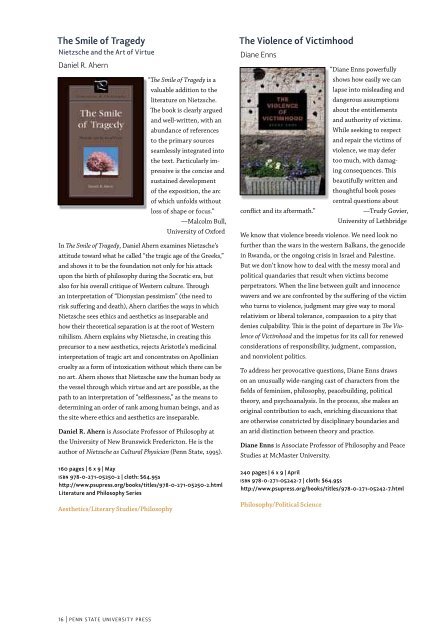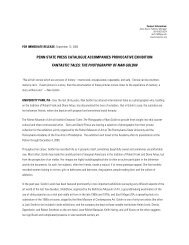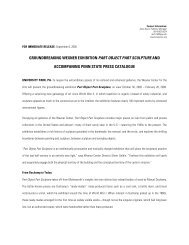journals - Pennsylvania State University Press
journals - Pennsylvania State University Press
journals - Pennsylvania State University Press
Create successful ePaper yourself
Turn your PDF publications into a flip-book with our unique Google optimized e-Paper software.
The Smile of Tragedy<br />
Nietzsche and the Art of Virtue<br />
Daniel R. Ahern<br />
“The Smile of Tragedy is a<br />
valuable addition to the<br />
literature on Nietzsche.<br />
The book is clearly argued<br />
and well-written, with an<br />
abundance of references<br />
to the primary sources<br />
seamlessly integrated into<br />
the text. Particularly impressive<br />
is the concise and<br />
sustained development<br />
of the exposition, the arc<br />
of which unfolds without<br />
loss of shape or focus.”<br />
—Malcolm Bull,<br />
<strong>University</strong> of Oxford<br />
In The Smile of Tragedy, Daniel Ahern examines Nietzsche’s<br />
attitude toward what he called “the tragic age of the Greeks,”<br />
and shows it to be the foundation not only for his attack<br />
upon the birth of philosophy during the Socratic era, but<br />
also for his overall critique of Western culture. Through<br />
an interpretation of “Dionysian pessimism” (the need to<br />
risk suffering and death), Ahern clarifies the ways in which<br />
Nietzsche sees ethics and aesthetics as inseparable and<br />
how their theoretical separation is at the root of Western<br />
nihilism. Ahern explains why Nietzsche, in creating this<br />
precursor to a new aesthetics, rejects Aristotle’s medicinal<br />
interpretation of tragic art and concentrates on Apollinian<br />
cruelty as a form of intoxication without which there can be<br />
no art. Ahern shows that Nietzsche saw the human body as<br />
the vessel through which virtue and art are possible, as the<br />
path to an interpretation of “selflessness,” as the means to<br />
determining an order of rank among human beings, and as<br />
the site where ethics and aesthetics are inseparable.<br />
Daniel R. Ahern is Associate Professor of Philosophy at<br />
the <strong>University</strong> of New Brunswick Fredericton. He is the<br />
author of Nietzsche as Cultural Physician (Penn <strong>State</strong>, 1995).<br />
160 pages | 6 x 9 | May<br />
isbn 978-0-271-05250-2 | cloth: $64.95s<br />
http://www.psupress.org/books/titles/978-0-271-05250-2.html<br />
Literature and Philosophy Series<br />
Aesthetics/Literary Studies/Philosophy<br />
The Violence of Victimhood<br />
Diane Enns<br />
“Diane Enns powerfully<br />
shows how easily we can<br />
lapse into misleading and<br />
dangerous assumptions<br />
about the entitlements<br />
and authority of victims.<br />
While seeking to respect<br />
and repair the victims of<br />
violence, we may defer<br />
too much, with damaging<br />
consequences. This<br />
beautifully written and<br />
thoughtful book poses<br />
central questions about<br />
conflict and its aftermath.” —Trudy Govier,<br />
<strong>University</strong> of Lethbridge<br />
We know that violence breeds violence. We need look no<br />
further than the wars in the western Balkans, the genocide<br />
in Rwanda, or the ongoing crisis in Israel and Palestine.<br />
But we don’t know how to deal with the messy moral and<br />
political quandaries that result when victims become<br />
perpetrators. When the line between guilt and innocence<br />
wavers and we are confronted by the suffering of the victim<br />
who turns to violence, judgment may give way to moral<br />
relativism or liberal tolerance, compassion to a pity that<br />
denies culpability. This is the point of departure in The Violence<br />
of Victimhood and the impetus for its call for renewed<br />
considerations of responsibility, judgment, compassion,<br />
and nonviolent politics.<br />
To address her provocative questions, Diane Enns draws<br />
on an unusually wide-ranging cast of characters from the<br />
fields of feminism, philosophy, peacebuilding, political<br />
theory, and psychoanalysis. In the process, she makes an<br />
original contribution to each, enriching discussions that<br />
are otherwise constricted by disciplinary boundaries and<br />
an arid distinction between theory and practice.<br />
Diane Enns is Associate Professor of Philosophy and Peace<br />
Studies at McMaster <strong>University</strong>.<br />
240 pages | 6 x 9 | April<br />
isbn 978-0-271-05242-7 | cloth: $64.95s<br />
http://www.psupress.org/books/titles/978-0-271-05242-7.html<br />
Philosophy/Political Science<br />
New in Paperback<br />
Public Forgetting<br />
The Rhetoric and Politics of Beginning Again<br />
Bradford Vivian<br />
Winner, 2011 James A. Winans–Herbert<br />
A. Wichelns<br />
Memorial Award for Distinguished<br />
Scholarship in<br />
Rhetoric and Public Address,<br />
National Communication<br />
Association<br />
“In his sustained meditation<br />
on forgetting,<br />
Bradford Vivian makes<br />
a singular and extremely<br />
valuable contribution<br />
to the field of memory<br />
studies. He substantially<br />
advances the theoretical discussion of memory and forgetting<br />
with his extended critiques (rhetorical analyses, really)<br />
of both ancient and recent formulations of collective public<br />
memory and forgetting. The conclusion is almost poetic<br />
in its lightness of touch. It pulls all the strands of the<br />
book into a single compelling case for forgetting as part of<br />
memory.” —James E. Young,<br />
<strong>University</strong> of Massachusetts Amherst<br />
Forgetting is usually juxtaposed with memory as its opposite<br />
in a negative way: it is seen as the loss of the ability<br />
to remember, or, ironically, as the inevitable process of<br />
distortion or dissolution that accompanies attempts to<br />
commemorate the past. The civic emphasis on the crucial<br />
importance of preserving lessons from the past to prevent<br />
us from repeating mistakes that led to violence and injustice,<br />
invoked most poignantly in the call of “Never again”<br />
from Holocaust survivors, tends to promote a view of<br />
forgetting as verging on sin or irresponsibility. In this book,<br />
Bradford Vivian hopes to put a much more positive spin on<br />
forgetting by elucidating its constitutive role in the formation<br />
and transformation of public memory. Using examples<br />
ranging from classical rhetoric to contemporary crises<br />
like 9/11, Public Forgetting demonstrates how, contrary to<br />
conventional wisdom, communities may adopt idioms of<br />
forgetting in order to create new and beneficial standards<br />
of public judgment concerning the lessons and responsibilities<br />
of their shared past.<br />
Bradford Vivian is Associate Professor of Communication<br />
and Rhetorical Studies in the College of Visual and Performing<br />
Arts at Syracuse <strong>University</strong>.<br />
216 pages | 6 x 9 | available now<br />
isbn 978-0-271-03666-3 | paper: $25.95s<br />
http://www.psupress.org/books/titles/978-0-271-03665-6.html<br />
Communication Studies/Philosophy/Political Science<br />
Kant’s Political Theory<br />
Interpretations and Applications<br />
Edited by Elisabeth Ellis<br />
“One of the really remarkable<br />
aspects of political<br />
philosophy over the last<br />
three or four decades—<br />
spanning Arendtian,<br />
Habermasian, and<br />
Rawlsian theory—has<br />
been the stunning revival<br />
of interest in Kantian political<br />
thought. Elisabeth<br />
Ellis has put together a<br />
collection of essays featuring<br />
many of the most<br />
prominent and influential<br />
contributors to recent scholarship on Kant, thereby helping<br />
us to appreciate why themes from Kantian political<br />
reflection (focusing on liberal justice and autonomy) are<br />
back on the radar screen of contemporary theorists and<br />
why they are very likely to remain there.”<br />
—Ronald Beiner, <strong>University</strong> of Toronto<br />
Kant’s writings on politics were seldom viewed as having<br />
much importance by past interpreters of his thought,<br />
especially in comparison with his writings on ethics, which<br />
received the lion’s share of attention (along with his major<br />
works, such as the Critique of Pure Reason). But in recent<br />
years a new generation of scholars has revived interest in<br />
what Kant had to say about politics. This volume of essays<br />
offers a comprehensive introduction to Kant’s often misunderstood<br />
political thought from a position of engagement<br />
with today’s most pressing questions. Covering the full<br />
range of sources of Kant’s political theory—including not<br />
only the Doctrine of Right, the Critiques, and the political essays<br />
but also Kant’s lectures and minor writings—the volume’s<br />
distinguished contributors demonstrate that Kant’s<br />
philosophy offers compelling positions that continue to<br />
inspire the best thinking on politics today.<br />
Aside from the editor, the contributors are Michaele Ferguson,<br />
Louis-Philippe Hodgson, Ian Hunter, John Christian<br />
Laursen, Mika LaVaque-Manty, Onora O’Neill, Thomas W.<br />
Pogge, Arthur Ripstein, and Robert S. Taylor.<br />
Elisabeth Ellis is Associate Professor of Political Science at<br />
Texas A&M <strong>University</strong>.<br />
256 pages | 6 x 9 | August<br />
isbn 978-0-271-05377-6 | cloth: $64.95s<br />
http://www.psupress.org/books/titles/978-0-271-05377-6.html<br />
Philosophy/Political Science<br />
16 | penn state university press www.psupress.org | 17

















